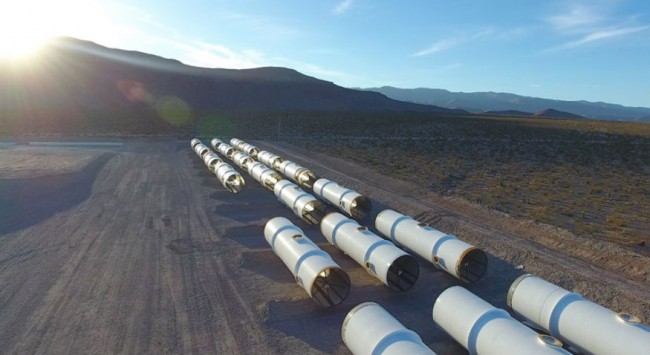There are no functional, real-world examples of a Hyperloop, Tesla founder Elon Musk's long-distance transport concept that involves shooting people through vacuum-sealed tubes in pods that travel at up to 760 mph. Anyone who believes it's a viable endeavor is basically taking it on faith.
"Hyperloop One" -- the $130 million startup promoting the idea -- has built a short 500-meter test track in the desert outside of Las Vegas but has yet to construct a pod to go with the tube, much less tested the technology on humans.
And yet a surprising number of government agencies are treating the Hyperloop as a serious proposition.
The company invited local governments and organizations to team up and plan a national network for the Hyperloop in what it calls its "Global Challenge" -- and transportation agencies responded. High-level executives including Colorado DOT Director Shailen Bhatt traveled to DC for the company's U.S. launch event, reports The Verge.
These officials' willingness to participate confers more legitimacy on Hyperloop One, which recently boasted:
Several [applications] come with the support of governors, mayors, Congressional representatives, and regional planning commissions. The Nevada and one of the Colorado proposals are officially sponsored by their state Department of Transportation. The DOTs of Florida and Texas are a partner to their Challenge proposal.
Another willing partner is the regional planning organization for Columbus, Ohio -- MORPC -- which submitted an application and was chosen by Hyperloop One as one of 35 metro area "finalists."
In its pitch, Hyperloop One promises to vacuum tube people from Columbus to Chicago in 29 minutes, one link in a network connecting other mid-sized cities at warp speeds.
MORPC's application [PDF] affirms not only that the agency is willing to devote staff resources to Hyperloop development, but that it will also help bring in private capital:
MORPC is ready to provide support in land use, population, and transportation forecasting; overall project coordination; and financing and operations technical assistance...
MORPC will work with partners across the Midwest region to identify and engage private sector partners in an effort to attract investment in both the study and development of a Hyperloop corridor.
Hyperloop One even sells the technology as a solution to high housing prices, by enabling, for instance, "breadwinners to build a career in Boulder’s thriving tech hubs while commuting from Greeley, where median home prices are 60% lower." It is a promise to enable sprawl so central cities can relax and avoid the difficult politics of creating more walkable development and inclusive housing policies.
Four years ago, mathematician and transit analyst Alon Levy wrote an epic takedown about the viability of Hyperloop technology. Levy evaluated Musk's white paper [PDF] detailing how the Hyperloop would connect L.A. to San Francisco in about 30 minutes, and he found major problems. Musk's cost estimates for engineering and land acquisition are inexplicably low -- by a factor of 10 compared with current market norms, he said. (Whether people will be comfortable under to that type of propulsion is a whole other question. Levy says the Hyperloop would be a "barf ride.")
America has the means to reduce traffic and connect people to where they want to go in less time -- but solving these problems entails politically difficult choices to shift travel away from cars and highways. Any high-tech solution that promises a shortcut around these thorny problems is probably too good to be true. Like "personal rapid transit" or the Chinese "straddling bus" -- the Hyperloop could end up taking credulous believers for a ride.





